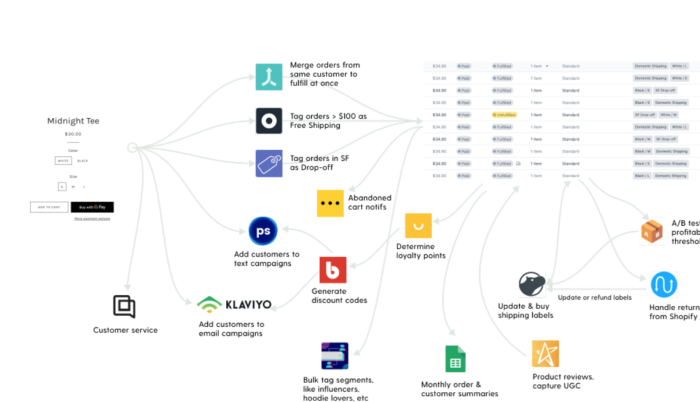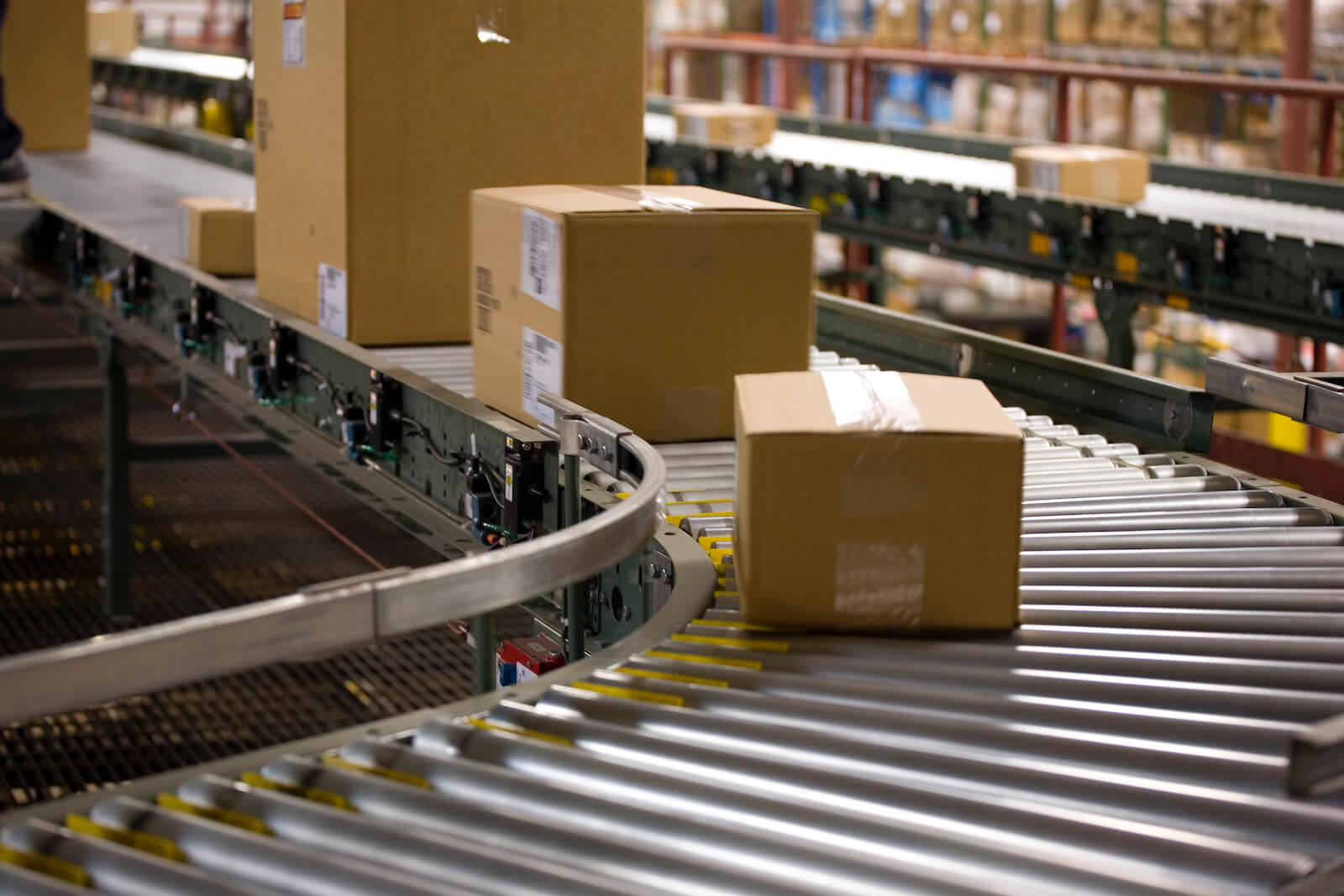Table of Contents
** Minutes
Ecommerce automation enables growth
Why successful ecommerce shops embrace automation
Where you can (and should) automate
Where should you automate first?
5 tools that can automate your ecommerce business for high growth
Running an ecommerce store isn’t easy due to how complex the industry has become. Just this year alone, the ecommerce industry has experienced rapid growth that forced many online retailers to scale up their operations. Between managing marketing initiatives, customer service, inventory, fulfilment, and other areas of your store, your team’s time can be taken up by lots of manual, repetitive, and time-consuming tasks.
As a store owner, you want to keep your store running as efficiently as possible. Wouldn’t it be great if you could automate manual tasks so you can focus more time and energy on strategic projects?
This is where automation comes into focus. By leveraging automation for your ecommerce store, you can automate many of your day-to-day tasks, scale your business, improve supply chain efficiency, and increase customer satisfaction. In this ecommerce automation guide, we’ll go over how automation works, the benefits of automation, and tools that help you with automating your store.
What is ecommerce automation?
Ecommerce automation focuses on eliminating most or all of the manual processes and tasks involved in running an ecommerce store. This is done through automated workflows, software, and integrations.
Ecommerce automation enables growth
One of the biggest benefits of ecommerce automation is that it allows you to scale your business faster. Instead of hiring multiple people to work on manual tasks, you can build automated workflows that help your existing team scale their productivity.
For example, with customer service automation, you could create automatic replies to common questions to reduce the number of tickets your support team has to handle on a daily basis. Another automation can be used for fraud. As your online store grows, fraudulent orders will become more common. If an order has a high-risk level, you can automatically cancel the order to prevent a chargeback and save money in the long run.
Though it can help your entire team be more efficient, ecommerce automation enables you, the business owner, to step into a more strategic role by automating tasks that take up too much of your time.
Why successful ecommerce shops embrace automation
Manual tasks are prone to human error which can harm your business. Just one mistype on a discount code could lead to customers getting 100% off instead of 10%. Whether it’s a marketing initiative or fulfiling and shipping orders, many manual tasks can, and should, be automated to reduce error while speeding up processes.
Time savings
Your team members have important tasks that have to be done on a day-by day-basis, and many of these tasks are likely handled manually. Do you wish you wouldn’t have to update sales tax info in QuickBooks every day? Or do you get tired of exporting data to Google Sheets to generate reports? The good thing is most of these tasks are ripe for automation.
With automation, your team can automate tasks like order tagging, generating picking lists, customer segmentation, and much more. All the time savings can add up and result in your team having more time to focus on more valuable projects.
Cost savings
Automation provides cost savings by helping ecommerce businesses spend less money on labour. Since automation works 24/7, you can scale your existing team’s productivity without having to go through the labourious hiring process. Since automation can also improve accuracy, you can save money by reducing error, which can be costly in the long run.
Better order accuracy
When done right, automation can help improve order accuracy. Errors on orders can happen for any number of reasons when manually inputting data. With automation, all your order information is updated using bots, making picking and packing items much more easier. This means you can worry less about mispicks and other mistakes that can ruin the customer’s experience with your brand.
Better data collection & analytics
Your ecommerce store generates a constant flow of data on a daily basis. With so much data being generated in real-time, trying to manage all that data manually or with multiple apps or databases is time-consuming and makes you miss out on potential insights about your business. With automation, you can get rid of data silos and build data and analytics reports that keep you aware of how your business is performing, from cart abandonment rates to order fulfilment performance.
Integrate your apps
Most ecommerce stores use multiple apps to run their operations. Some of the most popular ecommerce apps like Klaviyo, Smile.io, Postscript, ReCharge, Gorgias, and more are used by thousands of online stores. But not all solutions integrate with one another, making it hard to manage operations in one place.
For example, ecommerce SMS marketing is a rising channel for online stores that can outperform email and become the central point of communication with customers. Wouldn’t it be great if you could send texts to customers about your rewards program instead of doing it through email?
Where you can (and should) automate
Every ecommerce store is different. Depending on what types of products you sell, how big your store is, and how your customers engage with your business, it can be tough to know where automation can be useful. As you begin your ecommerce automation journey, here’s what we recommend automating first.
1. Store operations
There’s a lot that goes into operating a store, so the first step is to take a closer look at your task list and identify opportunities to automate. By automating manual tasks that take up valuable time and are highly prone to human error, you can open your time up for more big picture initiatives, rather than feeling bogged down by minuscule, daily tasks while improving operations.
2. Inventory management
Out-of-stock inventory can harm your reputation with customers. By implementing inventory management software, you can automate inventory tracking tasks, such as setting up reorder notification points when inventory levels fall below a certain threshold. This way, you can reduce manual inventory monitoring and speed up the reorder process.
3. Order management & fulfilment
Automating the fulfilment process allows you to efficiently pick, pack and ship orders, so orders can be shipped out sooner. With automation, your team can speed up the picking and packing process by automating warehousing tasks and removing manual work.
For instance, ShipBob’s proprietary warehouse management system (WMS) automatically assigns similar orders with inventory in the same area they’re stored in to the same picker to reduce the number of steps required to pick orders for a more efficient workflow.
“When I was gearing up to launch the business, I was looking for someone who would automate fulfilment for us. I chose ShipBob, and it turned out to be a very easy and scalable solution.
Everything was automated, from setting up my store, to sending product, to fulfiling orders.
It was pretty remarkable how a 24-year-old like me with very little money and no prior logistics experience could launch a product and have distribution be automated.”
Josh Hollings, Founder & CEO of Drop FX
4. Order processing
When an order is purchased, there’s a lot of behind the scenes work that goes on. Orders have to be tagged, customers have to be put into specific email lists, loyalty points have to be generated, and so much more. In the image below, you’ll see that automation, each app is operating in a silo.


Though you can make it work, it can cause confusion. For example, if you use Klaviyo for email and Postscript for SMS, customers could end up getting messages from both platforms with confusing messaging. With automation, apps and processes can be connected to ensure the order processing is done quicker and smoothly.
5. Customer service and support
Many ecommerce customer service software offers the ability to automate and manage customer inquiries. This way, you can spend less time replying to common questions customers have and more time focused on product development, marketing campaigns, and other areas of your business to grow your business.
6. Ecommerce marketing
Ecommerce marketing automation is a big focus for many growing online brands. By automating marketing tasks, you can create personalised campaigns for each customer to help improve conversion rates and see a better return on investment (ROI) for your marketing campaigns.
You might be familiar with ecommerce marketing automation tools like Klaviyo, Postscript, Omnisend, and others, but we’re talking specifically about using automation to streamline the entire marketing process.
Where should you automate first?
Before implementing any type of automation software, you will need to identify where automation fits best in your organisation. To do so, you can ask questions like:
- What is taking up the most time?
- What tasks are redundant and could be easily automated?
- Where should your attention be more focused?
5 tools that can automate your ecommerce business for high growth
There are many automation tools available for ecommerce brands. Here are five of the top automation tools you can use for your store:
1. Alloy Automation
Alloy Automation is a no-code tool for ecommerce brands to set up automated workflows that eliminate the time-intensive tasks associated with running their stores. Top direct-to-consumer brands and agencies, like Red Antler and Lick Home, use Alloy to automate a variety of manual tasks such as retail fulfilment, marketing, customer support, and more. Alloy works with a variety of ecommerce platforms including Shopify, BigCommerce, and WooCommerce.
Since Alloy is an automation tool, it helps automate many facets of your ecommerce store including:
- Marketing
- Customer service
- Fulfilment and shipping
- Inventory management
- Product listings
- Store operations
- And much more
Alloy integrates with leading ecommerce solutions like ShipBob, ReCharge, Gorgias, Postscript, Smile.io, Klaviyo, and more. Alloy also provides more than 200 pre-built workflow recipes so stores can select the workflows best suited to their business and activate them with just a few clicks.
2. ShipBob
ShipBob is a best-in-class, tech-enabled 3PL for ecommerce businesses. ShipBob provides an international fulfilment network and proprietary technology that offers full built-in inventory and order management tools for full visibility, free data and analytics reporting, a dedicated customer support team, and expertise to help you be more successful online.
ShipBob partners with brands of all sizes and provides a robust fulfilment network with the ability to split inventory across multiple fulfilment centre locations. ShipBob owns its entire tech stack, which allows you closely monitor inventory levels at each location all from one dashboard. ShipBob also makes it easy to integrate your online store and other sales channels with our technology, or you can utilise ShipBob’s Developer API for a more robust solution.
ShipBob helps automate the following:
- Warehousing
- Picking and packing
- Inventory control
- Order management
- Ecommerce returns
3.Gorgias
Gorgias is a help desk for ecommerce stores that helps you automate customer service and support. It also allows your customer service team to manage all of your support and customer service in one place. Top ecommerce stores use Gorgias to reduce ticket first response time and increase the efficiency of their customer support teams.
Using Gorgias gives your customer support team a true all-in-one help desk experience across email, live chat, phone, Facebook, Instagram, contact us page in one unified view to streamline your support tickets, saving you time and money.
Gorgias helps automate the following:
- Ticket tagging
- Replies based on customer intent
4. Yotpo
Yotpo helps ecommerce merchants generate product reviews, user-generated content (UGC), create rewards and loyalty programs, and use SMS to help drive qualified traffic, increase conversion rate and boost sales.
Yotpo helps automate the following:
- Customer reviews
- UGC
- Loyalty & rewards
- SMS marketing
5. Skubana
Skubana excels at making operational complexity more manageable. It unifies order and inventory data from across your ecosystem and makes it easy to analyse and automate, no matter how much you grow.
Skubana helps automate the following:
- Order routing
- Shipping
- Inventory
- Purchasing tasks
Conclusion
Ecommerce automation is one of the most exciting trends in the ecommerce industry. With many ecommerce stores beginning to upend traditional brick-and mortar-stores, they’ll need to leverage automation to keep up with customer demand and profitably to grow their business. To begin automating your ecommerce store, check out Alloy Automation to learn how we can help automate your store in minutes.
For help on optimising your fulfilment process, click the button below to request custom pricing from ShipBob.
FAQs on ecommerce automation
We’ve come across a lot of questions about ecommerce automation. Here are some of the common questions we’ve seen:
How do you automate ecommerce?
Ecommerce automation begins by implementing the right automation technology. For instance, Alloy offers a great ecommerce automation tool that can be used on most ecommerce platforms. Other aspects of the ecommerce supply chain, such as fulfilment and shipping, can also be automated by partnering with a 3PL like ShipBob.
How do I automate ecommerce customer service?
Ecommerce customer service can be automated with the right technology. There are several great solutions on the markets, including Gorgias, Zendesk, and Freshdesk that help to streamline your customer service processes.
Why is automation important for online businesses?
Automation helps online businesses save time and money while growing their business. With automation, businesses can scale much more effectively by implementing technology and tools to automate time-consuming processes, reduce human error by eliminating manual work, and save energy to focus more on strategic projects that will help grow your business.



